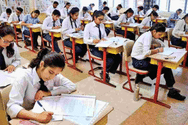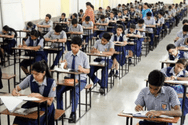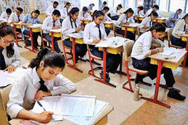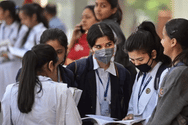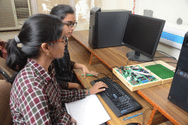- CBSE 12th Syllabus Political Science 2025 Download PDF
- How To Download CBSE Syllabus for Class 12 Political Science …
- CBSE Class 12 Political Science Syllabus 2025 Course Structure
- CBSE Class 12 Political Science Unit-Wise Syllabus 2025
- CBSE Class 12 Political Science Internal Assessment 2025
- CBSE Class 12 Political Science Question Paper Design 2025
- CBSE Class 12 Political Science Question Paper Structure 2025
- CBSE Class 12 Political Science Deleted Syllabus 2025
- CBSE Class 12 Political Science Books 2025
- CBSE Class 12 Political Science Preparation Tips 2025
- Faqs
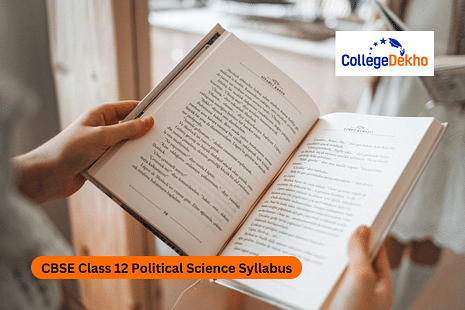

Never Miss an Exam Update
CBSE Syllabus for Class 12 Political Science 2025 is now available on the official website to be downloaded by the students. Political Science as a subject will deal with the understanding of social structures and methods used to manage the Government. CBSE will use NCERT textbooks to teach the students. There will be two parts to the CBSE Class 12 Syllabus 2025 for Political Science: Contemporary World Politics and Politics in India Since Independence. Students are advised to check the latest CBSE 12th Exam Pattern 2025 as well to make their preparation more effective. After completing the political science syllabus students must solve CBSE Class 12 Political Science Previous Year Question Paper and CBSE Class 12 Political Science Sample Paper 2025 for better grades.
Based on the CBSE class 12 Political Science 2025 syllabus PDF both parts will be 40 marks each. There are 7 chapters in part A and 8 chapters in part B. The chapter with the most weightage in Political Science is the last chapter on Recent Developments In Indian Politics. The chapter with the least weightage is the chapter on the Politics Of Planned Development which is in the second part. Students must give proper time for each subject so that they can get good marks in the board exams. CBSE 12th Board Exam 2025 will start on February 15, 2025. Check the CBSE Syllabus for Class 12 Political Science 2025 here.
CBSE 12th Syllabus Political Science 2025 Download PDF
On the official website, the students will be able to find the latest PDF of the Political Science syllabus. Students can also download the CBSE 12th syllabus for Political Science from the direct PDF link given below:
How To Download CBSE Syllabus for Class 12 Political Science 2025?
The official curriculum for class 12th is now uploaded on the official website of CBSE Academics. The students can download the updated curriculum for Political Science by following the simple procedure given below:
- Step 1: You will first have to visit the official website of CBSE Academics at cbseacademic.nic.in
- Step 2: The home page will open on your screen where you will have to click on the option called Curriculum on the menu bar.
- Step 3: A dropdown menu will appear. You have to now click on the option called Curriculum 2025
- Step 4: A new page will open on your screen where you have to click on the option called Senior Secondary Curriculum (XI-XII)
- Step 5: A lot of options will open on your screen where you have to click on the option called Academic Electives - (Group A)
- Step 6: Click on the Political Science option and the PDF of the syllabus will open on your screen.
CBSE Class 12 Political Science Syllabus 2025 Course Structure
There are numerous units and various topics included in the Political Science subject. Students must have the perfect idea regarding the topics included in the syllabus so that they can get good marks. Check the weightage of different topics and units here:
Chapter Names | Topics | Marks |
|---|---|---|
PART A-CONTEMPORARY WORLD POLITICS | ||
The End of Bipolarity | a) The Soviet System b) Gorbachev and the disintegration c) Causes and Consequences of disintegration of Soviet Union d) Shock Therapy and its Consequences e) New entities in world politics Russia Balkan States Central Asian States f) India's relations with Russia and other post-communist countries | 6 |
Contemporary Centres of Power | a) European Union b) Association of Southeast Asian Nations c) Rise of China as an economic power d) Japan and South Korea as emerging powers | 6 |
Contemporary South Asia | a) Military and Democracy in Pakistan and Bangladesh b) Monarchy and Democracy in Nepal c) Ethnic Conflict and Democracy in Sri Lanka d) India-Pakistan Conflicts e) India and its Neighbours f) Peace and Cooperation | 6 |
| International Organisations |
a) Meaning and importance of International Organisations
b) Evolution of the UN c) Structure and function of International Organisations d) Principal Organs of UN e) Reform of the UN after Cold War f) Reform of Structures, Processes and Jurisdiction of the UN g) India and the UN Reformsh) Key Agencies: IMF, World Bank, WTO, ILO, IAEA.i) NGO: Amnesty International, Human Rights Watch. j) Implications and Future of International Organizations | 6 |
Security in the Contemporary World | a) Meaning and Type of Security. b) Traditional concept of security c) Non-tradition notions of Security. d) New Sources of Threats e) Cooperative Security f) India’s Security Strategy | 6 |
Environment and Natural Resources | a) Environmental Concerns b) Global Commons c) Common but differentiated Responsibilities d) India’s Stand on Environment Issues e) Environmental Movements f) Resource Geopolitics g) Rights of Indigenous peoples | 6 |
Globalisation | a) Concept of globalization b) Causes and Consequences of globalization c) India and globalization d) Resistance to globalization e) India and resistance to globalization | 4 |
PART B-POLITICS IN INDIA SINCE INDEPENDENCE | ||
Challenges of Nation-Building | a) Challenges for the new Nation. Three Challenges. b) Partition: Displacement and Rehabilitation. Consequences of Partition. c) Integration of Princely States. The problem Government’s approach Hyderabad Manipur d) Reorganisation of States | 6 |
Era of One-Party Dominance | a) Challenge of building democracy. b) Congress dominance in the first three general elections. Nature of Congress dominance Congress as a social and ideological coalition. Tolerance and management of Factions c) Emergence of opposition parties. | 4 |
Politics of Planned Development | a) Political contestation. Ideas of Development. Planning Planning Commission b) The Early Initiatives The First Five Year Plan. Rapid Industrialisation. | 2 |
India’s External Relations | a) International Context b) The Policy of Non-Alignment. Nehru’s role Distance from two camps. Afro-Asian Unity c) Peace and conflict with China The Chinese Invasion1962 War and Peace with Pakistan Bangladesh War 1971 d) India’s Nuclear Policy | 6 |
Challenges to and Restoration of the Congress System | a) Challenge of Political Succession From Nehru to Shastri From Shastri to Indira Gandhi b) Fourth General Election 1967 Context of the Election. Non-Congressism Electoral Verdict Coalitions Defections c) Split in the Congress Indira vs the Syndicate Presidential Election 1969 d) The 1971 Election and Restoration of Congress The outcome and after Restoration? | 4 |
The Crisis of Democratic Order | a) Background to Emergency. Economic Context. Gujarat and Bihar Movements Conflict with Judiciary b) Declaration of Emergency Crisis and Response Consequences c) Lessons of the Emergency. d)Politics after Emergency. Lok Sabha Elections 1977 Janata Government Legacy | 4 |
Regional Aspirations | a) Region and the Nation Indian Approach Areas of Tension Jammu and Kashmir Roots of the Problem External and Internal disputes Politics since 1948 Insurgency and After 2022 and Beyond b) Punjab Political Context Cycle of Violence Road to Peace c) The Northeast's Demand for autonomy Secessionist Movements Movements against outsiders Assam and National Integration | 6 |
Recent Developments in Indian Politics | a) Context of 1990s b) Era of Coalition Alliance Politics c) Political rise of the Backward Classes Mandal Implemented Political Fallouts d) Communalism, Secularism and Democracy. Ayodhya Dispute Demolition and after e) Emergence of New Consensus f) Lok Sabha Elections 2004 g) Growing Consensus | 8 |
Total | - | 80 |
CBSE Class 12 Political Science Unit-Wise Syllabus 2025
The detailed course structure along with the learning outcome is mentioned below:Part A
| Chapter Name | Learning Outcome |
|---|---|
1. The End of Bipolarity Topics to be focused: a) The Soviet System b) Gorbachev and the disintegration c) Causes and Consequences of disintegration of Soviet Union d) Shock Therapy and its Consequences e) New entities in world politics Russia Balkan States Central Asian States f) India's relations with Russia and other post-communist countries |
|
2. Contemporary Centres of Power Topics to be focused: a) European Union b) Association of Southeast Asian Nations c) Rise of China as an economic power d) Japan and South Korea as emerging powers) |
|
3. Contemporary South Asia Topics to be focused: a) Military and Democracy in Pakistan and Bangladesh b) Monarchy and Democracy in Nepal c) Ethnic Conflict and Democracy in Sri Lanka d) India-Pakistan Conflicts e) India and its Neighbours f) Peace and Cooperation |
|
4. International Organizations Topics to be focused: a) Meaning and importance of International Organisations b) Evolution of the UN c) Structure and function of International Organisations d) Principal Organs of UN e) Reform of the UN after Cold War f) Reform of Structures, Processes and Jurisdiction of the UN g) India and the UN Reforms h) Key Agencies: IMF, World Bank, WTO, ILO, IAEA. i) NGO: Amnesty International, Human Rights Watch. j) Implications and Future of International Organizations |
|
5. Security in the Contemporary World Topics to be focused: a) Meaning and Type of Security. b) Traditional concept of security c) Non-tradition notions of Security. d) New Sources of Threats e) Cooperative Security f) India’s Security strategy |
|
6. Environment and Natural Resources Topics to be focused: a) Environmental Concerns b) Global Commons c) Common but differentiated Responsibilities d) India’s Stand on Environment Issues e) Environmental Movements f) Resource Geopolitics g) Rights of Indigenous peoples |
|
7. Globalisation Topics to be focused: a) Concept of globalisation b) Causes and Consequences of globalisation c) India and globalisation d) Resistance to globalisation e) India and resistance to globalisation |
|
Part B
| Chapter Name | Learning Outcome |
|---|---|
1. Challenges of Nation Building Topics to be focused: a) Challenges for the new Nation. Three Challenges. b) Partition: Displacement and Rehabilitation. Consequences of Partition. c) Integration of Princely States. The problem Government’s approach Hyderabad Manipur d) Reorganisation of States. |
|
2. Era of One Party Dominance Topics to be focussed: a) Challenge of building democracy. b) Congress dominance in the first three general elections. Nature of Congress dominance Congress as a social and ideological coalition. Tolerance and management of Factions c) Emergence of opposition parties |
|
3. Politics of Planned Development Topics to be focussed: a) Political contestation. Ideas of Development. Planning Planning Commission b) The Early Initiatives The First Five Year Plan. Rapid Industrialisation |
|
4. India's External Relation Topics to be focussed: a) International Context b) The Policy of Non- Alignment. Nehru’s role Distance from two camps. Afro Asian Unity c) Peace and conflict with China The Chinese Invasion 1962 War and Peace with Pakistan Bangladesh War 1971 d) India’s Nuclear Policy. |
|
5. Challenges To and Restoration of the Congress System Topics to be focused: a) Challenge of Political Succession From Nehru to Shastri From Shastri to Indira Gandhi b) Fourth General Election 1967 Context of the Election. Non Congressism Electoral Verdict Coalitions Defections c) Split in the Congress Indira vs the Syndicate Presidential Election 1969 d) The 1971 Election and Restoration of Congress The outcome and after Restoration? |
|
6. The Crisis of Democratic Order Topics to be focused: a) Background to Emergency. Economic Context. Gujarat and Bihar Movements Conflict with Judiciary b) Declaration of Emergency Crisis and response Consequences c) Lessons of the Emergency. d)Politics after Emergency. Lok Sabha Elections 1977 Janata Government Legacy |
|
7. Regional Aspirations Topics to be focused: a) Region and the Nation Indian Approach Areas of Tension Jammu and Kashmir Roots of the Problem External and Internal disputes Politics since 1948 Insurgency and After 2022 and Beyond b) Punjab Political Context Cycle of Violence Road to Peace c) The Northeast Demand for autonomy Secessionist Movements Movements against outsiders Assam and National Integration |
|
8. Recent Developments in Indian Politics Topics to be focused a) Context of 1990s b) Era of Coalition Alliance Politics c) Political rise if the Backward Classes Mandal Implemented Political Fallouts d) Communalism, Secularism and Democracy. Ayodhya Dispute Demolition and after e) Emergence of New Consensus f) Lok Sabha Elections 2004 g) Growing Consensus |
|
CBSE Class 12 Political Science Internal Assessment 2025
Students are required to make a project in Political Science according to the guidelines issued by the Central Board of Secondary Education in Internal Assessment and they will be just based on the following components:
SL.NO. | Components | Marks Allotted |
|---|---|---|
1 | Introduction/Overview | 2 |
2 | Variety Of Contents | 3 |
3 | Presentation | 3 |
4 | Conclusion | 1 |
5 | Bibliography | 1 |
6 | Viva-Voce | 10 |
Total | - | 20 |
CBSE Class 12 Political Science Question Paper Design 2025
50% of the questions in class 12th will be competency-based questions in the academic year 2025. Students can refer to the detailed information about the Question Paper Design for CBSE class 12 Political Science from the table given below and prepare for the board exams accordingly:
S. No. | Competencies | Marks | Percentage |
|---|---|---|---|
1 | Knowledge and Remembering: Exhibit memory of previously learned material by recalling facts, terms, and basic concepts. | 22 | 27.5% |
2 | Understanding: Understanding of facts and ideas by organizing, comparing, explaining, describing, and stating main ideas. | 24 | 30% |
3 | Applying: Solve problems by applying acquired knowledge, and facts to interpret a situation/cartoon/clippings/sources/Map | 22 | 27.5% |
4 | Analysis and Evaluation: Classify, compare, contrast, or differentiate between pieces of information; organize and/or integrate from a variety of sources; Examine, and synthesize information into parts and identify motives or causes. Make inferences and find evidence to support generalizations. | 12 | 15% |
Total | 80 | 100% |
CBSE Class 12 Political Science Question Paper Structure 2025
The theory paper in Political Science will be conducted for 80 marks. It will consist of MCQs, short answer type questions, long answer type questions, etc. Students can refer to the detailed structure of the question paper from the table given below:
Book | Objective Type/MCQ (1 Mark) | Short Answers Type I (2 Marks) | Short Answers Type II (4 Marks) | Passage/Map/Cartoon Based (4 Marks) | Long Answers (6 Marks) | Total Marks |
|---|---|---|---|---|---|---|
Book 1 Contemporary World Politics | 6 | 3 | 3 | 1 (Passage) | 2 | 40 |
Book 2 Politics in India Since Independence | 6 | 3 | 2 | 2 (Cartoon and Map) | 2 | 40 |
Project/Practical | - | - | - | - | - | 20 |
Total No. of Marks and Questions | 1x12=12 | 2x6=12 | 4x5=20 | 4x3=12 | 6x4=24 | 80+20=100 |
CBSE Class 12 Political Science Deleted Syllabus 2025
Students can refer to the information about the deleted CBSE Class 12 Political Science Syllabus 2025 from the tables given below according to the different parts:
Part A
Chapter | Page No. | Dropped Topics/ Chapters |
|---|---|---|
Chapter 1: The Cold War Era | 1-16 | Full Chapter |
Chapter 3: US Hegemony in World Politics | 31-50 | Full Chapter |
Part B
Chapter 2: Era of One-party Dominance | 41 | Full Page |
|---|---|---|
Chapter 3: Politics of Planned Development | 54-61 | Full 8 Pages |
62 | Content with Visual | |
63 | Exercise Questions 7, 8 and 9 | |
Chapter 6: The Crisis of Democratic Order | 105 113–117 | Full Chapter “Controversies regarding Emergency” |
Chapter 7: Rise of Popular Movements | 128–147 | Full Chapter |
Chapter 9: Recent Developments in Indian Politics | 187-189 | “Gujarat Riots” |
194 | Question 1(f) |
CBSE Class 12 Political Science Books 2025
There are a lot of side books available from different publishing houses to help the students prepare for the CBSE Class 12 Political Science Exam 2025. Check here:
- Contemporary World Politics Textbook in Political Science for Class 12
- Political Science CBSE for Class -12
- Together With Cbse Question Bank Class 12 Political Science 2025
- All In One - Political Science For CBSE Exam Class 12th
- Arihant CBSE Sample Question Papers Class 12 Political Science Book for 2025
- Arihant CBSE Chapterwise Solved Papers 2025-2008 Political Science Class 12th
- CBSE Chapterwise Solved Papers 2023-2014 Political Science Class 12th (2025 Exam)
CBSE Class 12 Political Science Preparation Tips 2025
Some specific preparation tips can be followed by the students to get good marks in the CBSE Class 12 Political Science Exam such as:
- Complete your NCERT before diving onto the side books so that you understand the basic concepts included in the curriculum. Make sure to solve every question included in your NCERT textbooks and then solve the other important questions included in the side books and sample papers.
- Try to practice writing your answers in pointers rather than writing long paragraphs. If you write your answers in pointers then you are presentation will be tidy which can easily get you some extra marks.
- Make sure to complete the sample papers available on the official website of the Central Board of Secondary Education. You can also go for the previous year's question papers uploaded by CBSE to check the commonly asked questions.
- Make notes after the end of every lecture to understand and remember the knowledge shared by your teachers.
- Practice meditation and yoga to lower your stress levels. Enjoy time in nature and take daily walks to boost your immune system and keep yourself healthy mentally and physically.
CBSE Syllabus for Class 12 Political Science 2025 will help the students to prepare for the subject in depth. Check the complete information about the focus topics and much more above. Students appearing for the CBSE Class 12 exam in 2025 must complete the syllabus 2 months before the exam commencement. They must keep these two months for practicing sample papers.
FAQs
The best books to prepare for the CBSE syllabus for class 12 Political Science are NCERTs. NCERTs are available separately for the two parts of the syllabus. Before hopping on to the side books you must complete your NCERTs.
The CBSE syllabus for class 12 Political Science is uploaded on the official website of CBSE Academics to be downloaded by the students in a PDF format. You just need to click on the Curriculum option present on the menu bar to download the syllabus.
The least important chapter in the CBSE syllabus for class 12 Political Science is the one with the least amount of marks allotted. The chapter with the least amount of marks allotted by the authorities is "Politics Of Planned Development" in Part B.
All the chapters are important in the CBSE syllabus for class 12 Political Science. However, one must prepare well for the chapter with the most weightage and the chapter with the most weightage is Recent Developments in Indian Politics.
All the subjects in part A have an equal weightage of 6 marks each except one. The subject with less weightage in the CBSE syllabus for class 12 Political Science Part A is Globalisation.
The subject with the most weightage in the CBSE syllabus for class 12 Political Science Part B is Politics Of Planned Development. The marks allotted for this chapter are two marks.
CBSE syllabus for class 12 Political Science will include chapters like Challenges of Nation-Building, Era of One-Party Dominance, Politics of Planned Development, India’s External Relations, Challenges to and Restoration of the Congress System, The Crisis of Democratic Order, Regional Aspirations and Recent Developments in Indian Politics in Part B.
CBSE syllabus for class 12 Political Science will include chapters like The End Of Bipolarity, Contemporary Centers Of Power, Contemporary South Asia, International Organisation, Security In The Contemporary World, Environment And National Resources, and Globalization in Part A.
CBSE syllabus for class 12 Political Science will include two parts. The first part deals with contemporary world politics and the second part includes politics in India since independence.
Was this article helpful?





